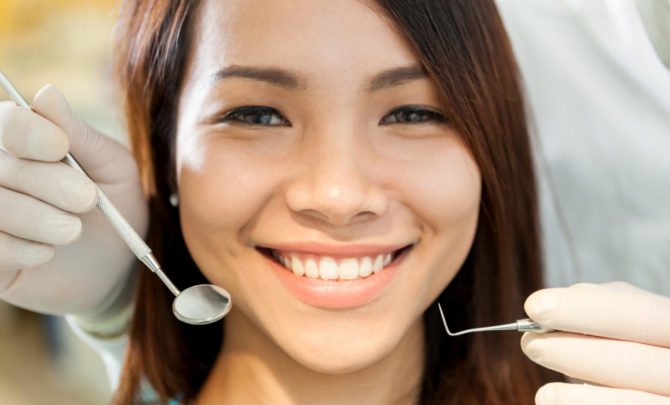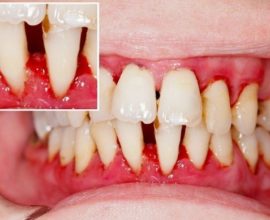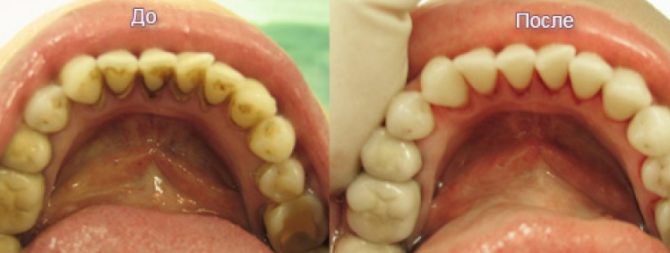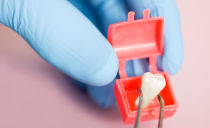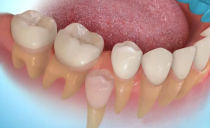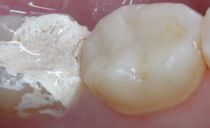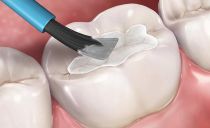Oral sanitation: what is it, who needs it and in what cases
When the dentist says that the oral cavity needs rehabilitation, this means that the patient has to get rid of all possible problems: caries, inflammation, plaque, tartar. The method of disposal is chosen by the doctor and depends entirely on the current condition of the teeth and gums.
Content
What is oral sanitation
The word sanitation in the generally accepted sense means improvement, recovery. In medicine, this term refers to examination for the purpose of treatment. Most of all, the word has taken root in dentistry. When the doctor confirms that the oral cavity has been sanitized, this means that the patient has been examined and received full treatment of teeth and gums.
In which cases the oral cavity needs rehabilitation
According to international standards of dental practice, sanitation of the oral cavity should be carried out once every six months. This is the period during which any patient must make at least one visit to the clinic. However, there are several indications for urgent dental sanitation out of plan. These include:
- preparation for procedures for installing braces on uneven teeth;
- upcoming denture installation;
- health improvement during pregnancy planning;
- frequent relapses of asthma, tonsillitis, allergies;
- period before surgery.
Sanitation of the oral cavity before surgery is necessary to exclude infection, to prevent its further spread.
More often than others dental sanitation should be carried out by people suffering from diabetes, suffering from chronic diseases of the cardiovascular system. This is due to the influence of diseases on the condition of the gums and dentin, often the surface layer of enamel also suffers.
Out of the plan, one has to go to dentistry to get information: for children undergoing nursery and school commissions, for adults when applying for a job, for pregnant women for admission to the hospital. In this case, the doctor makes an entry in the medical record and issues a certificate of dental examination. It indicates the date when the reorganization was carried out in dentistry.
How does the sanitation of the oral cavity and teeth
Since oral sanitation is the disposal of accumulated problems, the doctor takes a series of actions to identify them:
- Examines teeth, indicates identified problems.
- Assigns and conducts the necessary diagnostics: X-ray, tooth examination with a probe.
- Sounds a set of measures to eliminate detected defects.
If the doctor confirms that sanitation of the oral cavity is inevitable, then treatment follows. It may include:
- Removing completely decayed teeth.
- Elimination of caries foci.
- Cleansing tooth enamel from plaque and stone.
- Leveling defects of orthopedic products: bridges, crowns.
- Relief of inflammatory processes of periodontal tissue.
In the process of rehabilitation, specialists in the field of surgery, hygiene, orthodontics can be involved. Only when all the prescribed procedures are completed, the patient can receive a certificate of discharge from the dentist about rehabilitation.
Oral rehabilitation during pregnancy
Sanitation of the oral cavity during pregnancy is carried out taking into account the physiological state of the patient. In order not to harm the baby, doctors adhere to some restrictions.When examining and treating pregnant women use:
- locally irradiating radiovisiograph, which is allowed for examination in the second trimester of pregnancy;
- anesthetics that do not penetrate the placental barrier, adrenaline is excluded from the composition of these drugs.
All radical operations associated with tooth sanitation are assigned to the second trimester. Before childbirth and in the first months after conception, only extensive purulent inflammation or acute toothache can become an indication for treatment.
Future mothers often postpone a visit to the clinic due to bleeding gums, which, according to statistics, every second pregnant woman encounters from time to time. Patients think that the sanitation procedure will only aggravate the situation. Doctors have a different opinion: bleeding gums increases the risk of infection of the body, leading to gingivitis, periodontitis. Therefore, planned rehabilitation of the oral cavity during pregnancy cannot be abandoned.
Reconstruction of the oral cavity in children
The doctor tells the parents about the sanitation of the oral cavity in children and how it is performed. In different cases: when wearing orthopedic constructions or constant medical exposure due to the presence of any chronic diseases - rehabilitation plans may differ. But in most cases they are identical to the complexes developed in adult medicine.
Impressive and emotional children are recommended before going to the dentistry. They need sedation: the administration of sedatives. In special situations, before a complex operation with parents, the possibility of using general anesthesia is stipulated.
What gives children scheduled oral sanitation
Doctors believe that children are more in need of sanitation than adults. During the change of the milk bite to permanent teeth it is recommended to check them at least 4 times a year. Such frequent visits to the dentist may seem unnecessary to some parents. However, the data of medicine suggest the opposite.
 During routine inspections, the following are revealed:
During routine inspections, the following are revealed:
- foci of caries in milk and permanent teeth (in 80 percent of cases);
- malocclusion;
- mechanical damage to the enamel that parents cannot notice while brushing their child’s teeth;
- abnormal position of teeth ready to erupt.
All this needs to be corrected. Therefore, timely access to traditional medicine is of great importance. At the time of the doctor's appointment:
- treats caries, puts fillings;
- will seal the fissures;
- Coat the child’s teeth with fluoride varnish;
- determine a plan for further action, and in some situations give directions to narrow specialists: an orthodontist, a surgeon.
After the oral cavity is sanitized, proper care is necessary for the teeth. The doctor will also tell about this. It will help to choose the right toothpaste with the inclusion of suitable trace elements, a brush of the necessary hardness, and will announce the rules of hygiene.
Self Remediation
High-quality sanitation of the oral cavity is a complex procedure, carried out in several stages, using specialized equipment, medical preparations. The fact that a person brushed his teeth and used a rinse does not mean that his oral cavity is properly sanitized. All self-conducted events are only necessary prevention. A thorough and professional Only a dentist can carry out the procedure.
At home, it is necessary to clean the enamel from food particles, coffee and tea plaque, rinse your mouth with water, decoctions of herbs. Well, if dental floss is added to the usual tool, brush. With its help, it is easy to free interdental spaces.
Many doctors insist on mandatory cleaning of the tongue. Plaque may also accumulate on its surface. The rubberized back side of a regular brush is great for this. You can use special spoons and scrapers sold in pharmacies.
What ignores reorganization
That the oral cavity can become an active source of infectioneveryone knows. Constant humidity, viscous saliva, mucus that accumulates after eating create an optimal breeding ground for bacteria and various pathogenic microorganisms. Viruses successfully take root in it: it has been noticed that the chickenpox virus feels especially comfortable in such conditions.
Due to untimely examination and treatment, the dentist appears and develops diseases such as:
- atherosclerosis, and the more foci of inflammation or decay in the mouth, the more plaques on the walls of blood vessels;
- herpes;
- fungal mucosal lesions - candidiasis;
- tonsillitis - a frequent ailment of children who do not have the conditions for proper hygiene;
- rheumatism.
This means that you should not ignore the advice and help of a dentist. Treatment of any disease from this list will cost an order of magnitude more than a planned consultation and dental examination.

